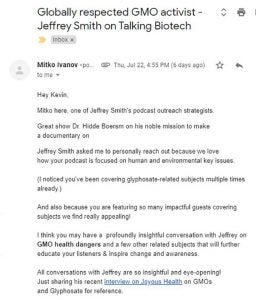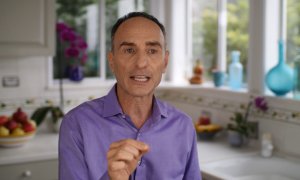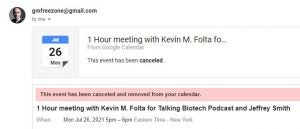Why ag needs to take the high road even if it is full of ugly potholes
As I opened the email I smiled with excitement. I’m the host of Talking Biotech, a popular podcast about genetic technology in agriculture and medicine. The email originated from the representatives of a staunch enemy of biotechnology. He wanted to be a guest. Kismet on steroids!
But a cloud of skepticism settled in. Why would a decades-long opponent of genetically engineered crops possibly want me to interview him? Why did he want to be heard by my audience? Was he going to publicly recant his 20 years of failed claims? Was he going to provide some blockbuster evidence that everything I know is false? Did he finally have legitimate evidence of a health risk from genetically engineered crops? I was intrigued.
Here was the email:

Without hesitation, I invited him to the show and confirmed a time for the interview.
Jeffrey M. Smith has poisoned the dialogue around genetically engineered crops since the late 1990s. He has no formal training in science or medicine. He touts his ballroom dance prowess and apparently is skilled in yogic flying. He is the undisputed darling of the anti-GMO movement, and his disinformation-laden books and documentaries have, unfortunately, been influential in breaking trust in modern food and farming.
He speaks with an unearned air of authority but is careful to strategically sprinkle plenty of weasel words to always crack the door of deniability when his damning predictions fail to materialize.
He runs the website Institute for Responsible Technology, which is an anti-biotech aggregation of bad science sponsored by anti-vaccination organizations, alternative medicine concerns, and organic food companies. The “institute” is a thin façade to disguise the anti-scientific positions espoused by Smith. This stink tank physically resides on a middle-class American street in Fairfield, Iowa, coincidentally at the same address as the company that publishes his books, tests DNA samples, houses a jewelry business, and probably him, too.
This intellectual hive of an “institute” is likely the broom closet where the litter box sits. Smith strikes me as a cat guy.

Smith has attacked me personally on Coast to Coast AM, the overnight Bigfoot/UFO/psychic AM radio show that also dabbles in the hyperbolic “dangers of GMO crops.” He has abused the Freedom of Information Act to capture thousands of pages of my personal and professional emails. He has ridiculed me in his circles and in his presentations. In 2013, Smith and his chosen scientific partner, Giles-Eric Seralini, backed out of a scheduled debate with journalist Jon Entine and me at the last minute.
So why would I possibly extend my somewhat powerful scientific media platform to such a flimsy enemy of agricultural innovation?
Because we always need to listen to those we disagree with and be fair to them.
It seems counterintuitive. Smith has spent a career bashing science and scientists, so why offer him a microphone? The answer is easy. I want his audience to trust me more than him, and that trust comes when I handle a devious fear monger with grace and respect.
The day before the interview I painfully reviewed his videos, writing down dozens of dead prognostications that aged like bad cheese. I studied his wacky interviews and read his recent campaigns, watching goalposts shift and fallacies crumble.

But mostly I hoped to use my podcast to understand him. Why oppose technology that is helping farmers and the environment? Why constrain technology from reaching the food insecure in the developing world? Most of all, why do it by being dishonest? Why peddle disinformation to confuse and scare people who are concerned about their food? I wanted to see the hamster run the squeaky wheel in his head — why does he do what he does? Were there applications of the technology he did endorse? What does he think of the COVID vaccines? So many questions!
Unfortunately, I never got to ask them. I was driving to work with the radio off, mentally salivating at the opportunity to win hearts and minds of Smith’s followers by letting this enemy of science punch himself with his own fist. Then his people called. Smith would not be joining me on the podcast.
I was disappointed, but not surprised. Those who profit from peddling disinformation risk losing their thin influence and microhero status in their pathetic little echo chambers of bogus fears and recycled lies.

His publicist was somewhat understanding. After all, they called me to book him, and backing out is bad form. She likely believes in his mission and associated Bee-Ess. She may question his integrity, as his request to cancel can be seen as Smith waving a surrender flag. This was his chance to kick some science butt, but he demurred. Maybe he is not so formidable after all …
My advice to Smith’s handler was the same I gave to Hari, Huber, and all of those trapped in a disinformation spiral that still pays the bills while they become increasingly irrelevant icons of a failed movement: Come clean now.
If Smith were to publicly state that he was wrong, that he knows the technology is not carrying the risk he claimed, that farmers should have choice, that consumers can benefit, and that the food insecure should have access to the best technology — his credibility would soar. He could state that he wants to focus on legitimate concerns around food and farming, influence healthy choices, and help small farmers compete. That would be fine, and the public that loathed him would forgive him. The few that revere him would understand. He’d have new books and documentaries about seeing the light of science, and he’d resurrect influence from the grave of pseudoscience.
For the rest of us, it is a reminder that we can influence others by kindly handling those who reject us, those who seek to harm us.
Hopefully, my invitation shows my intent for an honest dialogue. His cancellation reaffirms that he is not interested in an honest dialogue. This simple gesture of extending an opportunity to an established foe, and his rejection of that invitation, may just swing a few hearts and minds over to science. That is the power of handling a gross little adversary with a modicum of kindness and respect.
I do hope he flips to Team Science.
Kevin Folta is a land-grant scientist exploring ways to make better food with less input, and how to communicate science. This work reflects his private, personal opinions and may not represent the views his employer. This article was published on AGDAILY with his permission. All of Dr. Folta’s funding can be found at kevinfolta.com/transparency.



